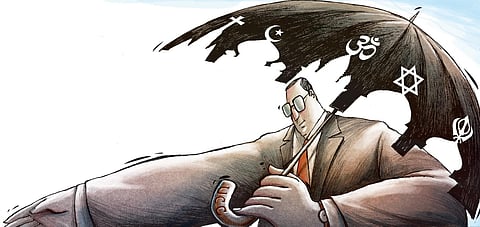Understanding UCC rumble
NEW DELHI: Amid speculation that a Uniform Civil Code (UCC) bill could be introduced as early as the monsoon session of Parliament, it has suddenly become a red-hot political issue occupying the nation’s mind space.
Enacting a common law that will apply to all religious communities has been an article of faith for the ruling BJP government. But its prioritisation months before the general elections has made it exceptionally emotive. At present, various aspects of life like marriage, inheritance, succession, adoption and guardianship of Hindus, Muslims, Christians and Parsis are governed by their own personal laws.
However, under Islamic law, polygamy is permitted. The USP of a good UCC would be to ensure gender justice across the board without trampling on the feet of people of different faiths. But that is easier said than done as it would require compromises from all sides. “It’s neither necessary nor desirable at this stage,” was how the 21st Law Commission in 2018 sought to put a lid on it while making a few interesting suggestions.
ALSO READ | UCC to be decisive in tribal-dominated states
However, the first indication of the Centre’s thought process came on June 14 when the 22nd Law Commission sought to dial up the UCC by seeking the opinion of all stakeholders. A week later, Prime Minister Narendra Modi publicly wondered, “How can a nation be run on two laws?” An informal group of ministers is now examining the matter.
Directive principles vs fundamental rights
The UCC finds mention in Article 44 of the Constitution. It is part of the Directive Principles of State Policy. “The State shall endeavour to secure for the citizens a uniform civil code throughout the territory of India,” Article 44 states. However, directive principles are not enforceable in court until they are made into law; they act as a guide for policy formulation. In contrast, fundamental rights are enforceable. Religious freedom to all citizens is part of fundamental rights.
The Goa model
Goa is the only state that has a UCC. People of all communities in the state are bound by the 154-year-old Portuguese civil code since its annexation in 1961. But it has its downside. For example, one of its provisions allows a Hindu husband can take a second wife in the absence of an issue if the wife has attained the age of 25, and also if she has attained the age of 30 without having a son. This is completely incompatible with the Hindu Marriage Act.
Recommendations of the 21st Law Commission
In 2018, the 21st Law Commission prepared a working paper, ‘Reform of Family Law’, after extensive discussions with various stakeholders. While stating that a UCC was neither necessary nor desirable at this stage, it observed that “most countries are now moving towards recognition of difference, and the mere existence of difference does not imply discrimination but is indicative of a robust democracy.”
In the absence of any consensus on a UCC, the Commission felt that the best way forward could be to preserve the diversity of personal laws but ensure that they do not contradict fundamental rights. It also recommended codifying the Muslim law on inheritance and succession and bringing in uniform succession provisions for Shias and Sunnis. “Succession and inheritance should be based on proximity to the deceased rather than a preference to male agnates,” it recommended. A Muslim widow, even if childless, should inherit the property of the deceased as a Class I heir,” it added.
The Commission further observed that the Hindu Undivided Family (HUF) system should be scrapped as it was being utilised only for tax evasion. HUF provides tax exemptions to Hindus as compared to other communities who are governed by the Indian Succession Act. The report also recommended that “no-fault divorce” must be introduced in all personal laws and property acquired after marriage must be divided between the two parties if the union comes to an end.
Why are tribals opposing it
Several tribal communities, including those in the Northeast have opposed the proposed UCC as they fear it will threaten their identity and autonomy. While tribal communities are mostly governed by their customary laws in matters of marriage, divorce, succession, inheritance, land and property, the Constitution also protects the local customs of tribes in certain states.
Sikh concern
Though Hindu laws encompass Sikhs as well, they also have the option of the Anand Marriage Act. The Act serves as a legal validation for Sikh matrimonial ceremonies (Anand Karaj). Although it has no provision for divorce and couples therefore are governed by the provisions of Hindu Marriage Act, 1955 several Sikh outfits are opposing the UCC to preserve the Anand Marriage Act.
Why are the Parsis upset
The Parsis have special rules for intestate under the Indian Succession Act, 1925. They also follow the Parsi marriage and the divorce Act, 1936. The community cannot legally adopt and if a woman marries outside the community, then she will be an outcast. The community is apprehensive that the UCC will take away the minority rights of the Parsis.

